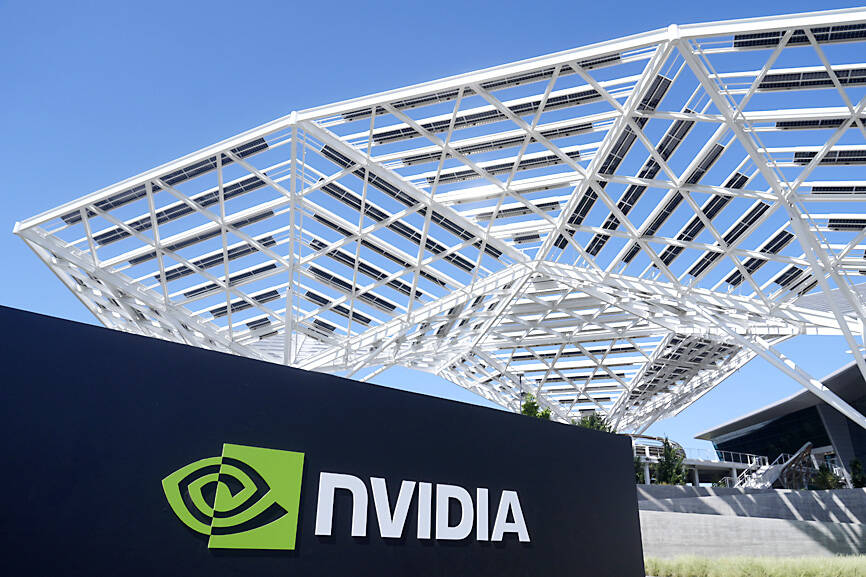Nvidia Corp, the chipmaker at the center of a boom in artificial intelligence (AI) use, is teaming up with Alphabet Inc’s Google to pursue quantum computing.
Google’s Quantum AI division is to use Nvidia’s Eos supercomputer to speed up the design of quantum components, the firms said in a statement on Monday.
The idea is to simulate the physics that is required for quantum processors to work. This field of computing aims to use quantum mechanics to create machines that are much faster than today’s semiconductor-based technology.

Photo: AP
However, it is still early.
Although some companies have claimed to make breakthroughs with quantum computing, it might take decades for large-scale commercial projects to be ready — if they come at all.
Nvidia, the world’s most valuable company, believes its technology will help Google sort out one thorny issue. As quantum processors become more powerful, it gets harder to distinguish between actual information and interference, known as noise.
“The development of commercially useful quantum computers is only possible if we can scale up quantum hardware while keeping noise in check,” said Guifre Vidal, a research scientist from Google Quantum AI. “Using Nvidia accelerated computing, we’re exploring the noise implications of increasingly larger quantum chip designs.”
To help make this happen, Nvidia is offering a giant computer powered by its AI accelerator chips. It is to simulate how the components of a quantum system will interact with their environment.
For example, many quantum chips have to be cooled to extremely low temperatures for them to work at all.
Such calculations have previously been extremely expensive and time-consuming.
Nvidia says its system will deliver results in minutes that would have taken a week before, at a fraction of the cost.

Sweeping policy changes under US Secretary of Health and Human Services Robert F. Kennedy Jr are having a chilling effect on vaccine makers as anti-vaccine rhetoric has turned into concrete changes in inoculation schedules and recommendations, investors and executives said. The administration of US President Donald Trump has in the past year upended vaccine recommendations, with the country last month ending its longstanding guidance that all children receive inoculations against flu, hepatitis A and other diseases. The unprecedented changes have led to diminished vaccine usage, hurt the investment case for some biotechs, and created a drag that would likely dent revenues and

Macronix International Co (旺宏), the world’s biggest NOR flash memory supplier, yesterday said it would spend NT$22 billion (US$699.1 million) on capacity expansion this year to increase its production of mid-to-low-density memory chips as the world’s major memorychip suppliers are phasing out the market. The company said its planned capital expenditures are about 11 times higher than the NT$1.8 billion it spent on new facilities and equipment last year. A majority of this year’s outlay would be allocated to step up capacity of multi-level cell (MLC) NAND flash memory chips, which are used in embedded multimedia cards (eMMC), a managed

CULPRITS: Factors that affected the slip included falling global crude oil prices, wait-and-see consumer attitudes due to US tariffs and a different Lunar New Year holiday schedule Taiwan’s retail sales ended a nine-year growth streak last year, slipping 0.2 percent from a year earlier as uncertainty over US tariff policies affected demand for durable goods, data released on Friday by the Ministry of Economic Affairs showed. Last year’s retail sales totaled NT$4.84 trillion (US$153.27 billion), down about NT$9.5 billion, or 0.2 percent, from 2024. Despite the decline, the figure was still the second-highest annual sales total on record. Ministry statistics department deputy head Chen Yu-fang (陳玉芳) said sales of cars, motorcycles and related products, which accounted for 17.4 percent of total retail rales last year, fell NT$68.1 billion, or

In the wake of strong global demand for AI applications, Taiwan’s export-oriented economy accelerated with the composite index of economic indicators flashing the first “red” light in December for one year, indicating the economy is in booming mode, the National Development Council (NDC) said yesterday. Moreover, the index of leading indicators, which gauges the potential state of the economy over the next six months, also moved higher in December amid growing optimism over the outlook, the NDC said. In December, the index of economic indicators rose one point from a month earlier to 38, at the lower end of the “red” light.